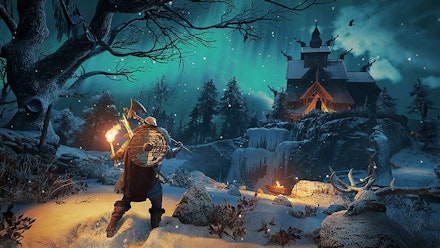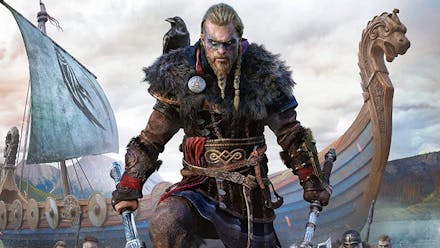Platforms: PS5, Xbox Series X / S, PS4, Xbox One, PC
After showing players the magnificence of ancient Egypt in Assassin's Creed Origins and the glory of the Greek pantheon in Odyssey, the series' latest location – 9th century England, splat in the middle of the Dark Ages – may feel like something of a downgrade. To an extent, it is – clambering up the odd abbey or abandoned Roman fort just doesn't have the sense of gravitas or splendour that standing atop Sphinxes or conquering epic statues of gods in the last two instalments offered.
Yet Valhalla{:rel=nofollow}’s more grounded, murkier, dirtier world is no less beautiful. Players follow orphaned warrior Eivor, adopted into the Raven Clan, and their journey from the frozen, snow-covered mountains and fjords of Norway to the comparatively warmer climes of England is brought to stunning life by developers Ubisoft Montreal. On Xbox Series X (version tested), the environments almost border on photo-real, and while the same plaudit can't quite be levelled at the game's characters, they're close to bridging that uncanny valley.

Whether in Norway or England, the series' signature open world feels like a neat evolution over previous entries. Although there are still a host of map icons pointing to objectives or collectibles, traversing the world feels more like exploration again, thanks to some fantastic environmental design, while now familiar tricks such as an avian partner to scope the lay of the land from overhead better tease you into investigating far-off corners. You're also rewarded for that exploration, with new abilities to be found in well-hidden lore books.
Hub areas feel more alive than ever, too, whether it's the settlement you build and develop upon landing in England, or the surprisingly large towns you'll discover. These offer some welcome down time, packed with mini-games – Orlog is an unexpectedly tactical dice rolling game, while engaging poets and bards in flyting challenges (think Viking rap battles) are a fun way to build your charisma stat, which in turn can open up more dialogue options elsewhere.
Another solid entry in the series, with beautiful settings to explore and a fantastic protagonist in Eivor.
Eivor themselves can be male, female, or alternate between the two due to some shenanigans related to the Animus, the present day/near-future tech that frames the historical adventures of the series. This also factors into the 'meta-plot' of the game, but frankly no one has cared about the framing device since the original Assassin's Creed trilogy – which was itself five games – concluded. The main story itself is a more personal affair than past entries though, more concerned with Eivor's history and prophecies of their future than the fate of the world. That said, the Norse gods poke their noses in here and there, so the series' weird blending of history and mythology remains intact.
The biggest gripe to level at Assassin's Creed Valhalla is that it's seemingly bored of the "assassin" part. Admittedly, Vikings – famously not known for their stealthy approaches – are a strange fit for the series anyway, but here, Eivor getting the now-iconic wrist blade feels a box-ticking exercise. Despite having a weapon designed for quickly and silently dispatching enemies, stealth often feels like an afterthought. Much of the game's combat is focussed on melee brawls, and a full on raids on rival factions, towns, or encampments are a regular fixture. Thankfully, these brutal engagements are fun, and a host of combat upgrades – unlocked as you level up – provide plenty of ways to customise how you fight.
Social stealth does at least enjoy a bit of a resurgence after Valhalla’s predecessors Origins and Odyssey largely ignored it, with Eivor able to don cloaks to blend into crowds or joining monks' solemn processions to avoid enemy detection, but the game really wants players to wade in, axe in hand, and maul people Viking-style. More than ever, the new-era Assassin's Creed series – as in, the form it's taken since Origins – is more RPG than stealth action, with comparative enemy strength determining if an assassination 'works'. There is an option in the settings to enable 'guaranteed assassinations' – because let's face it, a blade to the throat should be fatal even if a guard is ten levels higher than you – but you're met with a rather judgey message saying "you are not playing the game as it was intended to be experienced" if you select it.
Still, Valhalla does ultimately prove to be another solid entry in the series, with beautiful settings to explore and a fantastic – and unexpectedly witty – protagonist in Eivor. We'd just like to see Assassin's Creed as a series veer closer back to, well, assassination in future.
Buy Assassin's Creed Valhalla from Amazon.{:rel=nofollow}
